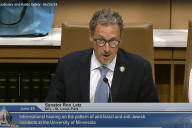You have /5 articles left.
Sign up for a free account or log in.
Wednesday’s Inside Higher Ed story about Hagerstown Community College gave me pause. There’s enough administrator bashing in higher ed already without me adding to it. And there’s almost always more to the story, as I’ve learned repeatedly. Still, assuming the story is factually correct, a couple of moments really jumped out at me as examples of a leadership style that I reject wholeheartedly.
The hook for the story was that HCC is shutting off VPN access for most employees as part of a move to bring them back to campus. That, in itself, is well within bounds. Whether it’s a good idea or not depends on local context, but it strikes me as the kind of judgment call that presidents have to make. So, OK. But it gets weirder from there.
The president has apparently forbidden faculty and staff from locking their office doors. The story quotes an email from him saying that “I can only assume that when I come upon a locked office or department, the occupants are on leave. At that point, I will ensure that Human Resources charges them with that leave appropriately.”
That’s … odd …
Ostensibly, part of the reason for revoking VPN access was to preserve the security of the VPN. They don’t want sensitive information leaking out. But then mandating that doors remain unlocked creates a far larger information and security hazard. Most faculty and many staff have confidential information in their offices, whether they be grades, student records, financial aid data or whatever. (Not to mention smartphones, umbrellas, purses and all manner of personal items.) Mandating that the offices that keep that information be unlocked, even when unoccupied, is almost inviting mischief. At the very best, it’s counterproductive.
On my own campus, the rule is quite the opposite. We want sensitive information kept safe. If a professor is teaching a class, or making a bathroom run, or going to a meeting, I’d much rather they lock their office than leave it open. I lock my office when I’m out, precisely because it contains information that isn’t public. I’ve been in meetings on information security with the campus CIO; concerns there range from unlocked offices to monitor screens facing outside windows. If you’re genuinely concerned about information security -- and campus leaders absolutely should be -- then you don’t mandate unlocked doors.
The contrast of the goal of information security with the mandate for unlocked doors is so fundamental that I have to assume that the stated goal isn’t real. The language of “I have to assume” comes across, in context, as imperious. If you aren’t where you’re “supposed” to be at any given moment, there can only be one explanation, the logic goes, and the explanation must be sinister.
Well, no. Not at all.
The tragedy of distrust is that it can become self-fulfilling. Overly strict rules tend to foster a cynical sort of gamesmanship, which can then reinforce the felt need to crack down. It’s true in parenting, and it’s true in managing. It can lead to a sort of cultural (or familial) death spiral.
At some point, leaders have to make a choice. Are you going to be the only person who matters, or do you want people throughout the organization to be capable and effective? If it’s the former, then yes, spot-check and micromanage and assume the worst of everybody. It will drive away those who can leave and wear down those who stay. It may lead to a sort of defeated compliance, at least superficially, but it will redirect energies toward internal politics and away from the task at hand. The resulting failures can confirm your sense of sole importance.
Or you can think of leadership positions as being entrusted, rather than entitled. That involves recognizing that while you can make a positive difference, you’re not the point of the place. It requires a certain humility, along with a serious sense of a larger purpose. Yes, sometimes it can mean being taken advantage of in the short term; trust can be betrayed, and occasionally it is. But over time, an organization with lots of effective people -- people who have the room to move and do their jobs without being presumed guilty -- will accomplish far more than one that lives in terror.
My own view has long been that the job of leadership is creating the environment within which people can do their best work, given the constraints at hand. Sometimes that means saying no to appealing requests, whether because of resources or fear of precedent-setting, but that’s okay; setting boundaries is part of the job. Respecting them is, too.







